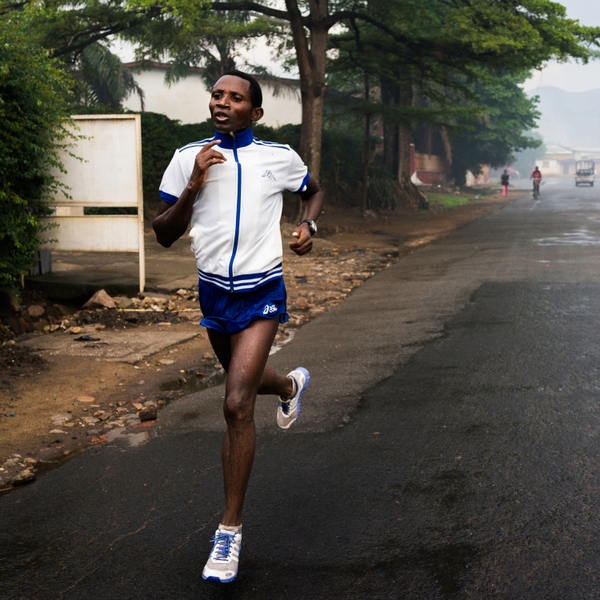How Jogging in Burundi Became an Act of War
For a decade, the African nation of Burundi was home to a unique phenomenon: group jogs involving thousands of people who hit the streets to sing, socialize, and sometimes protest the nation’s authoritarian president, Pierre Nkurunziza. In March 2014, he banned the activity. As conflicts threaten to boil over—and the body count continues to rise—runners have become both weapons and victims.
New perk: Easily find new routes and hidden gems, upcoming running events, and more near you. Your weekly Local Running Newsletter has everything you need to lace up! .
To go for a group jog in Bujumbura, Burundi’s capital, you must first join a jogging club and register with the government. Then you must choose one of nine approved venues. After that the police may have some questions. How many people will be there? When? Give us their names.
When I first heard about President Pierre Nkurunziza’s , it seemed like the work of a crackpot dictator, much like North Korea’s ban on blue jeans, China’s ban on unlicensed reincarnation, or any of a number of decrees out of Turkmenistan, where the former president once outlawed lip-syncing, gold teeth, and beards.
Except that this one felt even more fundamental. From the springy arch in our feet to the heat-dissipating veins in our heads, our bodies evolved to run. A whole suite of brain chemicals even reward the effort. A 2,000-year-old cave painting in Matobo National Park, in Zimbabwe, depicts a hunter lifting his arms in exultation at the end of a run.
Perhaps nowhere is jogging more integral than in Burundi. To understand why, you have to go back to the early 1990s, when tensions were rising between the Hutu and Tutsi ethnic groups.
In 1993, Melchior Ndadaye, the first Hutu president in the nation’s history, was killed by the Tutsi-controlled military just three months after taking office, an event that sparked a 12-year ethnic civil war that left 300,000 dead. During the conflict, soldiers would run through the streets in formation, boots clomping the ground, singing about their military prowess. The songs comforted supporters and intimidated the opposition. The soldiers sometimes stopped to administer random beatings.
At the same time, young Burundians were becoming more politically active and formed their own jogging clubs. For the most part, Hutus joined other Hutus and Tutsis joined other Tutsis in a show of solidarity. As fighting ebbed after a coup d’etat in 1996, the groups endured, eventually shedding their political origins. Dozens of clubs, some with hundreds of members, would meet to run and sing together on weekend mornings, then spend the rest of the day drinking Primus, the local lager. In time the clubs integrated and helped stitch the country back together, creating an apolitical, almost post-ethnic space. If someone in a jogging group had a death in the family or needed an extra set of hands on a project, the club helped. It was like all the best parts of a church, except the religion was running and the after-service snacks were copious amounts of beer. For more than a decade, jogging was to Bujumbura what music is to New Orleans.
“It was a time to meet and deal with the trauma, the fear, the loneliness,” political reformist Jean Claude Nkundwa told me. “Running became a culture.”
At first, President Nkurunziza supported that culture. The son of a Tutsi mother and a Hutu father, Nkurunziza taught physical education before joining a group of Hutu rebels in 1995. In 2005, he took power from a transitional government, building his reputation around fitness and public health. But in March 2014, with protests brewing over a rumored third term, he restricted clubs to approved locations and forced them to register. The political opposition responded with calls for his ouster, which turned into riots and assassinations targeting top generals. The tortured bodies of opposition members began showing up on the outskirts of town. Hundreds of thousands of people fled the country.
To an outsider, it looked like the president had banned group jogging and Burundi had crumbled. Surely this was not the whole story, but at a glance it seemed to fit. For me—and for many runners—a really hard run has the power to transform anxiety and depression into calm and confidence. We use the sport like a drug. A couple of days without a run and everything goes to hell. Could the same thing happen to an entire nation?
When I arrived in Bujumbura in late September, a haze blanketed the city. The air on the tarmac felt like a blast of wet heat. ���ϳԹ��� baggage claim, I scanned the crowd for Jean Baptiste Mubaribari, a local journalist who I’d enlisted as my driver and translator. I’d contacted him two days before arriving, when I learned that the government had blacklisted my previous translator, part of a campaign against journalists both foreign and domestic.
I had permission to be there, but my documents authorized me only to work on stories about jogging. Last summer, a French journalist who’d been permitted to cover elections had his credentials revoked for filming protests.
“Welcome,” said Jean Baptiste when we found each other. “You came at a good time.”
“How so?” I asked.
“Lots of shooting last night,” he said. “Huge battle. Really big.”
“You came at a good time,” said Jean Baptiste. “Lots of shooting last night. Huge battle. Really big.”
A tiny country of ten million sandwiched between Rwanda, Tanzania, and the Democratic Republic of the Congo, Burundi rates near the bottom in several unfortunate categories: hunger, poverty, corruption.
Like in Rwanda, half a century of violence between the Hutu and Tutsi ethnic groups lies squarely at the heart of its woes. But while Rwanda’s genocide, which claimed nearly a million lives in 1994, captured the kind of international attention that brought peacekeeping troops, NGOs, and enforced stability, Burundi has largely been left to figure things out on its own.
“Burundi is a country totally devoid of any importance,” wrote Peter Uvin in , the definitive but prematurely titled book on modern Burundi. “It has no economic or geo-strategic value to speak of.”
The country’s population is roughly 85 percent Hutu and 14 percent Tutsi, and its lasting conflict began in the early 20th century, when, in order to reduce the influence of the majority Hutus, colonial powers favored the much smaller Tutsi population, giving them access to education and wealth and control of the military. Though the definitions were somewhat fluid, Hutus were typically farmers and Tutsis raised livestock. It wasn’t until the early 1930s that Belgian colonialists formalized the distinction by issuing a Tutsi ID card to anyone owning more than ten cattle and a Hutu ID to everyone else.
When Burundi abolished its monarchy in 1966, animosities between the ethnic groups erupted. In 1972, a Hutu uprising and swift Tutsi military backlash left between 100,000 and 300,000 people dead (including Nkurunziza’s father); a coup in 1988 led to fighting that killed 25,000. Then came the civil war in 1993, which dragged into the mid-2000s.
The lone piece of good news regarding the latest round of turmoil is that it is nominally a political dispute, not an ethnic one—though the ruling party is largely Hutu and the opposition more or less Tutsi, and the so-called politics play out each night to the hammering of automatic weapons, particularly in the opposition-heavy Cibitoke neighborhood.
As we headed into the city center from the airport, there were checkpoints fretting the main roads, and police officers in blue jumpsuits waved cars over at random; at night they would string barbed wire to block passage so they could inspect every car. Burundi’s military is constitutionally barred from engaging in internal conflicts, so the police are like the government’s poorly disciplined muscle. Some of the nightly gunfire is from police accidentally shooting AK-47’s at each other.
These days police are also responsible for enforcing the jogging ban, dispersing any large groups found running through the streets—though, given the risk, such groups almost never gather. Individuals are sometimes hassled but are generally permitted to run. Most groups stick to the nine government-sanctioned locations, many of them playgrounds, doing a kind of large-scale aerobics instead of logging miles.
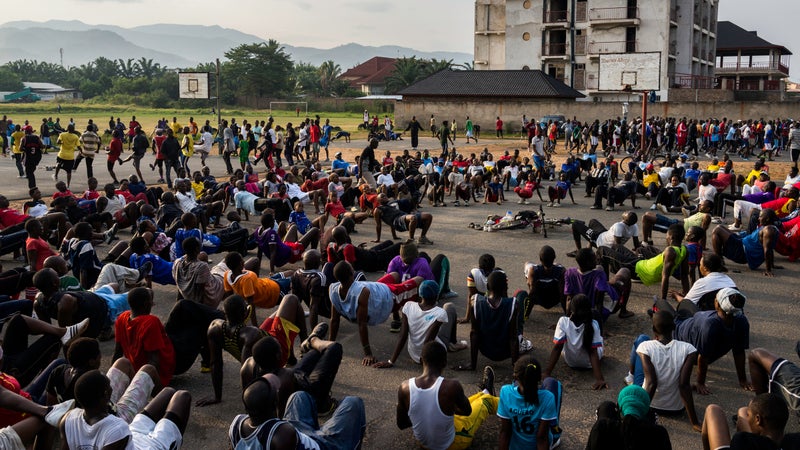
Despite the limitations, the workouts are still popular. On Fridays, the city government shuts down at 2 p.m. so that workers can attend. Most head toward Kiriri Hill—a nearly two-mile stretch of acute thigh torture rising toward Burundi University— and spend a few more hours exercising.
I happened to arrive on a Friday, and Jean Baptiste perked up when he realized the coincidence. “We will drive to the hill,” he said. “We will talk to the joggers about why they make sport.”
As we got closer to Kiriri, a group of runners began to coalesce, until a stream of people were flowing to the hilltop campus. ���ϳԹ��� the gate, a stern-eyed man sat on a folding chair; if it looked like someone was about to start shooting, he’d scatter everyone with a whistle blast.
“No photos, no videos,” he said when Jean Baptiste introduced me as a journalist.
The campus was the size of five or six soccer fields, and included an actual soccer field. While there were a variety of activities—basketball, some team handball, and two guys hitting a ball back and forth over a string, like tennis without the net—no one actually jogged. Most formed a big circle and followed a leader at the center doing exercises that the word calisthenics falls short of describing. They Hacky-Sacked with no Hacky Sack; they duck-walked rapidly; they squatted to do quick feet. Then they ran in place and punched the air in front of them, as if sweating it out on militaristic NordicTracks.
Jean Baptiste tried to land me interviews with some of the onlookers, but there were no takers. It’s not a partisan group, but most everyone worked for the city, and political sympathies reflect government jobs. Also, Burundi is not a place that takes press freedom very seriously. At the moment, in fact, there’s hardly any press at all. The international media left during a lull in the rioting, and most local journalists have long since fled to Rwanda for fear of being arrested or tortured. Jean Baptiste, a newspaper reporter, stuck around because hardly anyone reads, so the government wasn’t worried about him.
“He’s writing about jogging,” Jean Baptiste said to the crowd, speaking Kirundi, the local language. He smiled big, put his arms around people, and pointed excitedly in my direction.
Everyone ignored him. A passerby might have mistaken him for an exercise circle’s wildly ineffective leader.
“No video! No photo!” he pleaded.
No talking.
The sun dropped toward Lake Tanganyika, which forms a portion of the country’s western border, and we headed back to the hotel. Another journalist had recommended that I stay there for the thick concrete walls around its perimeter, the better to catch stray bullets. The precaution seemed like overkill until exactly 8:37, when the sound of distant gunfire rebounded off the hills and came lilting back through the city. Jean Baptiste called it “the music from Cibitoke.”
The next morning we headed for Tempete Playground, another sanctioned space for former jogging clubs, where half-buried truck tires separated a soccer field from basketball courts.
By 7 a.m., there were already 100 or so people there. These weren’t government employees, and Jean Baptiste knew the club’s leader, so I slid into one of the concentric circles to exercise with the crowd. We chanted, we counted reps in French, we stomped our feet, and we paused periodically to stretch. When my flexibility was found wanting, an older man physically moved my limbs into the right position, putting his body weight into the stretch and repeating the French command as though the problem was my hearing.
The club was not particularly athletic. Many members stopped partway through, finding my struggle entertaining. But one guy was really into it, screaming with almost religious delight as the moves got harder, the holds longer, and the sun hotter.
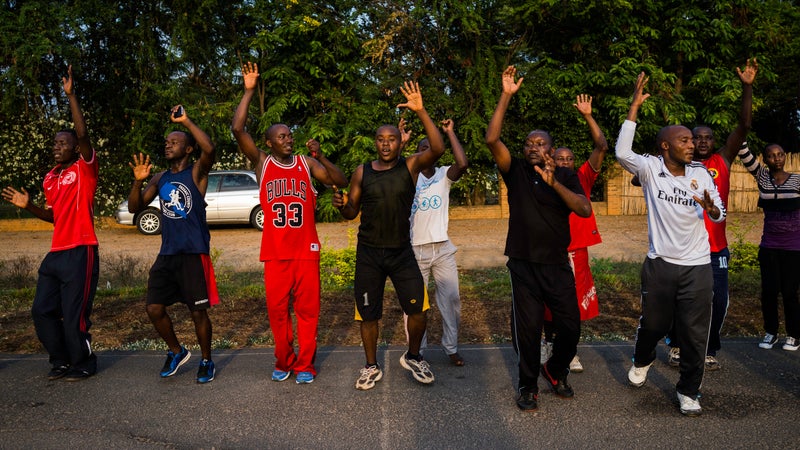
“Yes, Coach! Thank you!” he yelled when our leader stalled the count during a long string of sit-ups. “A thousand times, Coach. Please! Yeah!”
When we finished, he called out to me as I prepared to leave. “You are welcome!” he said. “Join us anytime!”
His name was Ferdinand Nitunga, and he told me that the group, called the Family Jogging Club, had changed his life. Ferdinand joined five or six years ago when a friend invited him. He said he liked it so much that every Saturday he jogged six miles from Gatumba, the suburb where he once lived, and ran the six miles back home. Then he did it again on Sunday.
A few days later, I met Ferdinand to run that route with him, to see what it had been like. Folks were just heading to work. Motorcycles skirted around us on the right; we sprinted past commuter buses on the left. We were technically breaking the law, but the police didn’t bother us.
Born in a rural part of the country, Ferdinand suffered debilitating headaches in school, and his father spent much of Ferdinand’s childhood in the hospital. Most kids in his situation would have stopped going, opting out of the substantial tuition fees to take up subsistence farming instead, but Ferdinand couldn’t stand to quit. He was smart and had a knack for languages. He excelled at French and spoke proficient if grammatically quirky English. He often out-performed his teachers. He was also, he discovered, one of those natural-born runners who only find out later in life that the sport is hard for the rest of us.
“Let us slow the pace, really,” Ferdinand said to me as traffic dispersed slightly outside the city. “I can listen to your breathing and hear the fatigue.”
At 14, looking for a way to continue his education and training, he moved in with an uncle in Gatumba and worked as a domestique in exchange for medicine and school fees—a common arrangement in Burundi. But then his uncle said that if Ferdinand wanted to continue living in his house, he should be prepared to drop out of school and join a group of Hutu rebels.
On the road to Gatumba, the sun had burned off the clouds outside the city as we ran along Lake Tanganyika in the ceaseless humidity.
“We can slow the pace again, if I am not mistaken,” Ferdinand said, in response to continued heavy breathing on my part.
“OK,” I said, relieved. I run four miles a day and almost never a step farther. “Are you tired?”
“I am not hardly.”
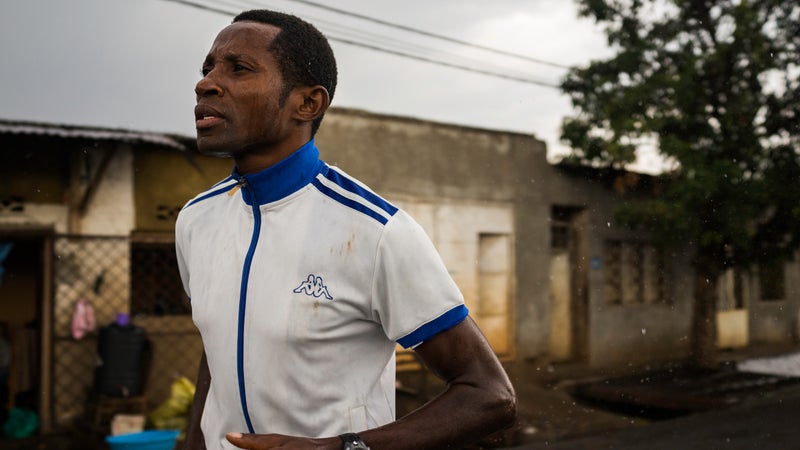
When the club’s leader heard the story of Ferdinand’s long runs from Gatumba to Bujumbura, he took a special interest, giving him tips on how to train and recover from injuries. Ferdinand told him that what he really needed was a job and a place to live. (He left out the rebels.)
The next weekend, the leader gathered the men from the club: Could anyone help?
A man named Jean Népomucène Hatungimana raised his hand. He was opening a bar, and Ferdinand could work and sleep there. He’d have an income. He could pay for school. Some years later, Jean Népomucène invited Ferdinand to live in his house.
“My dream really came true,” Ferdinand told me.
We arrived in Gatumba at a walk, my head spinning and calves twitching from running just one leg of Ferdinand’s commute. Then Jean Baptiste pulled up in the car with some water bottles and informed us that, by his odometer, the distance we just ran was almost nine miles, not six. Ferdinand shrugged. He was estimating.
Ferdinand’s talent may be uncommon, but his reliance on his club was not. Amid social and political turmoil and unpredictable violence, Burundians looked to jogging groups for stability.
Even nonathletes would show up in crowds large enough to stop traffic. To ban such a popular activity seemed foolish for a politician seeking reelection and particularly strange for President Nkurunziza, who is perhaps the world’s most fitness-minded head of state.
According to his press officer, the president swims for an hour each morning and then plays basketball or soccer for two hours in the afternoon. Some say that Nkurunziza owes everything he has accomplished to his athletic prowess: he studied phys ed at university at a time when most other Hutus were denied an education.
In 2003, after a ceasefire finally , Nkurunziza walked and rode his bike from the border of Tanzania to the city of Gitega—roughly 100 miles away and smack in the center of Burundi. Along the way, he gave speeches about moving past ethnic divisions. He was very popular. Two years later, the parliament appointed him president for a five-year term.
In 2007, he launched an effort to encourage even more of the country to exercise, making fitness a cornerstone of his administration. By that point, however, cracks were forming in his leadership. Radio journalists were breaking stories about the president’s corruption, and Burundians were just as hungry as they had been during the war, maybe hungrier.
One of Nkurunziza’s most outspoken critics was radio journalist . A Tutsi who briefly studied at Harvard, Sinduhije was named one of Time magazine’s 100 most influential people in 2008 for his efforts at reconciling the country’s ethnic divide. He had famously adopted a Hutu child orphaned by the war, and after founding Radio Publique Africaine in 2001, he’d hired both Hutu and Tutsi ex-combatants as reporters. But in 2007, Sinduhije quit journalism to launch his political career. He founded the Movement for Solidarity and Democracy (MSD) party, building on the idea that the government was corrupt, a notion that played well with young men in both ethnic groups. Eventually, he announced plans to run for president.
Police at MSD headquarters in 2008 and charged him with “insulting the president.” Supporters rallied outside the prison, however, and he was released. Though Nkurunziza was elected to a second term in 2010, the main opposition parties, including MSD, boycotted the process. They claimed that the government’s youth wing—the Imbonerakure, roughly translated as “visionaries”—used violence to intimidate voters. , but the election stood.
Looking back, it’s easy to see the ingredients of large-scale violence stewing together. At the time, however, it just looked like more jogging. By the summer of 2013, Bujumbura’s neighborhoods, which had previously been grouped by ethnicity, had reorganized along political lines, and a pro-government jogging club called Inkona (Eagle) started running through opposition neighborhoods in packs, much like the soldiers of previous conflicts. There were no beatings, and according to its founder, Jean Paul Niyihweze, the club was not political. But it had over 3,000 members across the city, and some factions radicalized and became militant. People living in opposition neighborhoods reported that when Inkona came through, they rewrote the lyrics to songs so that the words recalled the rape and violence of the civil war: Impregnate the rivals / So they can give birth to Imbonerakure.
MSD responded by forming its own jogging groups. It was thin cover for politics, but Nkurunziza’s athleticism created a kind of political shelter.
“The president is a sportif,” said MSD member Richard Ndihokubwayo. “He cannot criticize jogging.”
Richard is fierce looking, with two nearly symmetrical scars on his forehead, one from a broken bottle, the other from the butt of an AK-47. “These things happen in Burundi,” he said when I asked about them. I could use his name, he said, because the government was already hunting him. An article wouldn’t make things worse.
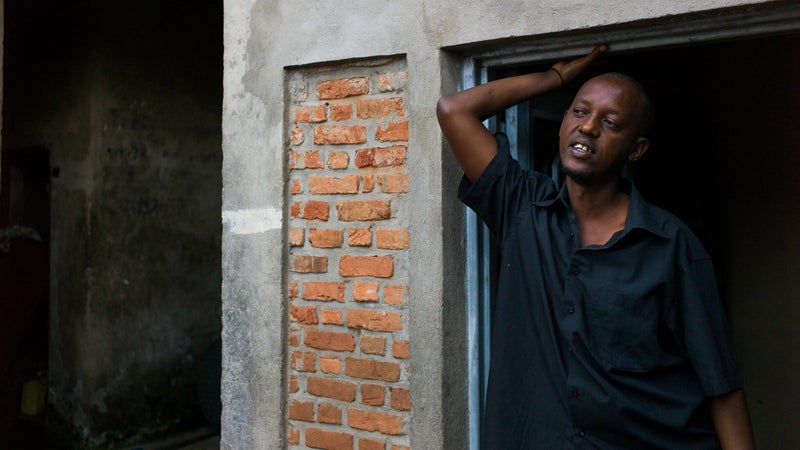
We met to talk several times, usually at my hotel, but sometimes he got spooked and insisted we go somewhere else—too many government license plates in the parking lot. During our first meeting, the hotel kitchen staff rushed over like they were seeing a ghost.
“Richard! We thought you were dead,” they said. “We thought they got you!”
Richard became a member of MSD in 2011, after the government insisted that he join their political party or lose his job as a sound tech in the parliament building. He’d grown up in the same neighborhood as Alexis Sinduhije and would sometimes sneak him recordings of closed-door meetings. Richard chose MSD.
Throughout the fall of 2013, MSD and Inkona clashed every weekend, slinging insults as they ran. MSD didn’t set out to jog through Inkona neighborhoods, Richard says, but they repeatedly did. And they didn’t shy away from taunting Inkona with their own songs.
“Inkona started to think that they were strong,” he said. “We started thinking that we are also strong.”
Sometimes minor aggressions turned into street fights. Sinduhije fueled the violence via radio broadcast. “The only thing that does not respond to a beating is a drum,” he said. “If someone hits you, hit them back twice.”
The conflict escalated on both sides. In the Kinama neighborhood, the Inkona club became something like a pro-government militia, with a mandate to protect the neighborhood and a promise of immunity for any crimes committed while doing so.
When I asked Jean Baptiste if he knew a member of Inkona, he spent half a day frantically trying to track one down. He turned up Moussa Nzeyimana, who’d joined in 2013 and was part of an outfit that ran through opposition neighborhoods looking to fight. He worked as a mechanic and had that hardened air of someone who uses his hands every day. When we picked him up, he was nervous and fidgety, hunkering down in the backseat until we reached a bar that was not technically open yet. A relatively expensive spot with the cheery, overbright color scheme of a tropical bird, it was the kind of place unlikely to be frequented by underground militias. There, Moussa finally felt safe enough to talk. Because he went by a nickname in the group, he made the strange request that I use his real name to protect his identity.
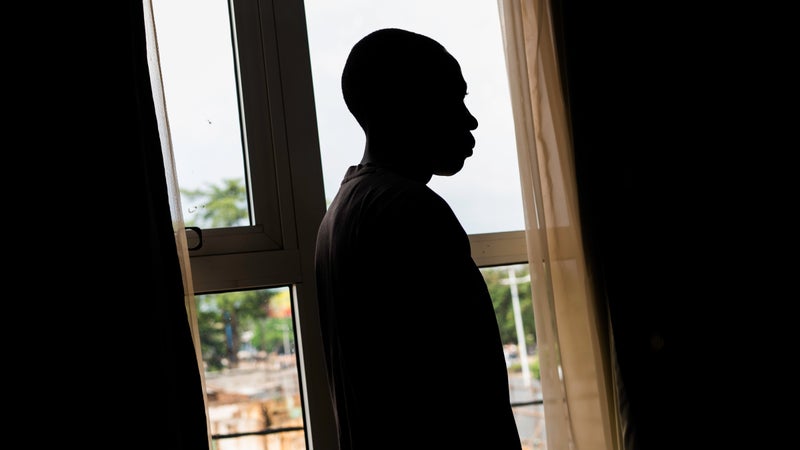
The club was treated well, Moussa said. They got extra food to help with their workouts and received weapons training on Tuesdays, Thursdays, and Saturdays. First he learned how to break down a gun and reassemble it. Then he learned how to shoot.
Instructions came in an envelope when they met to train. Moussa told me he didn’t know who wrote them. He quit the group after they were directed to attack the Cibitoke neighborhood and he realized that he knew most of the guys they were shooting at. They were his friends. He decided to disappear.
“I need to go,” he said to me. The first customer had just walked in the door. “Someone is going to see me talking.”
OK, but how did you disappear?
“I joined a different jogging club. They’ve been hiding me in their houses ever since,” he said. “Inkona hasn’t found me, yet.”
In February 2014, rumors began to spread that Nkurunziza would run for a third term. Doing so would bulldoze the 2000 Arusha Peace and Reconciliation Agreement for Burundi, which had laid the groundwork for a new government and constitution. The Arusha treaty limited presidents to two terms and integrated the military and the government, requiring a 60/40 split between Hutus and Tutsis in all government positions.
Nkurunziza’s party had never been satisfied with that split, however, saying that giving 40 percent of lucrative government jobs to 14 percent of the population was unfair. In March 2014, he put forth a constitutional amendment that would make it easier for Hutus to consolidate power in part by abolishing term limits. It by one vote. But while the treaty restricted the country’s leader to two terms, the constitution had a loophole. It said that presidents could only be elected by the people twice, and Nkurunziza had been appointed to his first term. By declaring himself eligible for a third term, he was signaling his willingness to circumvent the Arusha treaty altogether.
In response, MSD planned a protest, gathering together every party member in every quarter of Bujumbura on March 8. Instead of demonstrating, however, they would go for a jog. But someone tipped off the police, who responded by blocking the roads. Anyone in jogging clothes was turned back. Some tried to run past the blockades; those who were caught were beaten.
“That Saturday was the longest day I can remember,” Richard told me.
Looking back, it’s easy to see the ingredients of large-scale violence stewing together. At the time, however, it just looked like more jogging.
At 11 a.m., word went out to abandon the jog and meet at MSD headquarters. One hundred and twenty people made it to the compound, including Alexis Sinduhije.
Hundreds of police showed up outside the house around 1 p.m. Two officers snuck around the side, but MSD grabbed them and dragged them inside the compound.
“We made them our prisoners,” Richard said.
Pierre Claver Mbonimpa, a prominent human rights activist and former police officer, showed up to negotiate. Just send out the hostages, he said, and the police will let everyone go home.
MSD sent out the hostages. No one was allowed to go home.
The stalemate continued for hours. At 6 p.m., the MSD members inside the compound told Sinduhije that there was no use fighting. The police would storm the house when it got dark and probably kill him. Sinduhije climbed a ladder over the compound’s concrete walls. Then the police came in. Ten people were shot; none died.
“If you didn’t escape, you were shot or you were captured,” Richard said. At least 70 people were arrested that day, 22 of them on jogging-related charges. Forty-eight were ultimately given jail time, 21 of them . Richard got out by pretending to be a journalist, flashing a photo ID from his old job in parliament and telling an officer it was a press pass. The officer couldn’t read, so he let Richard go.
Sinduhije hid in the attic of a nearby house. Two cops showed up looking for him, and the owner invited them in, remarking that they looked thirsty. Sinduhije managed to escape after the officers drank an entire case of beer.
Over the next year, Nkurunziza’s bid for a third term became official. On April 25, 2015, he , and opposition groups organized protests, putting up barricades to keep security forces out of their neighborhoods. Police shot tear gas, protesters threw rocks, police responded with bullets. Seven people died that day.
The protests continued for weeks. Occasionally, impromptu groups formed to jog and sing together, running in tight circles up and down the blockaded streets. Ferdinand could see them from his house. “It was treated like a game,” he said. Except people were being shot. Sometimes one or two in a neighborhood, sometimes a half-dozen. Fifty-six in May. On weekends the protestors halted to bury the dead.
On May 13, major general Godefroid Niyombare on the radio while Nkurunziza was in Tanzania. There was celebratory gunfire all afternoon from opposition soldiers, then combative gunfire all night as forces battled for control of RTNB, the state radio station.
“It was the first case where we heard explosions,” said Orion Donovan-Smith, an American NGO worker who lived near the station. “I couldn’t go back to my house.”
During the fighting, private radio stations were raided and burned, and on the evening of May 14, general Prime Niyongabo that the coup had failed. Then, on May 23, opposition leader Zedi Feruzi was , launching a summer of tit-for-tat violence that was still in full swing when I arrived that fall: drive-by assassination attempts, abductions, sounds of torture overheard at night in government neighborhoods, and disfigured corpses turning up on the streets.
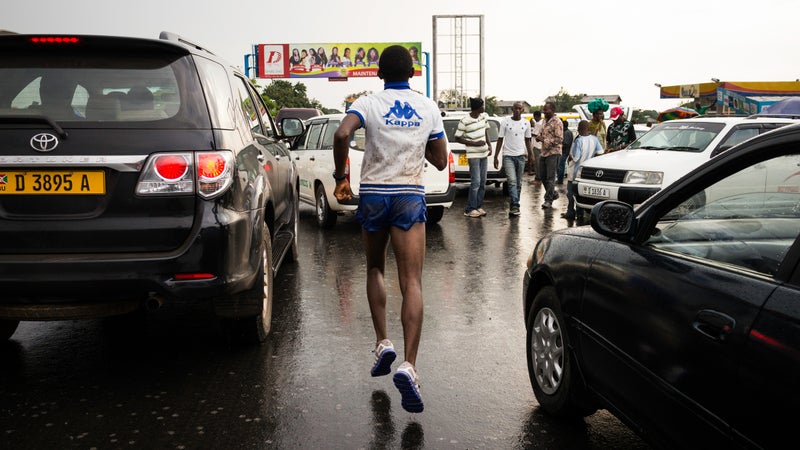
One night, Ferdinand, Jean Baptiste, and I were driving across the city after dark. Opposition forces had attacked a checkpoint a few hours before, so the police were taking a long time, and traffic was backing up.
“This is dangerous,” Ferdinand said. “If there is an attack, we are also a target.”
“Mmhmm,” Jean Baptiste agreed.
“The last general who was shot…,” Ferdinand said, trying to remember the name.
“Adolphe?” Jean Baptiste said.
“N��…�ĝ
“B����dz�������?”
“No, not him.”
“M��������������?”
“No, the last one,” Ferdinand said, the name on the tip of his tongue.
“P��������?”
“Yes! Prime. There were a lot of extra victims when he was shot.”
In the months that followed, the violence reached a new high—reports of gang rapes, grenade attacks, dozens of bodies discovered in mass graves outside the capital. The U.S. sanctioned both sides, the military began fracturing by political party, and the government and rebel groups gathered in Uganda for peace talks that went nowhere. Soon after I left, Jean Baptiste was arrested for working with journalists. They threatened him with torture, but he bribed his way out of jail and fled the country.
On one of my last full days in Burundi, I showed up for another workout at Tempete Playground. I was supposed to meet Ferdinand, but he was nowhere to be found. There were a thousand harmless reasons he might not show up, but Ferdinand was a guy whose life choices had largely been about figuring out a way to keep training. As I scanned the crowd for him, I became worried. The nightly shooting had ramped up in the past few days; it was so frequent and close that I could now hear the difference between handheld weapons and the belt-fed machine guns mounted on trucks as they moved through the city.
A few days before, Ferdinand explained to me that his living situation was less stable than he’d let on. He was not allowed to sit at the dinner table during meals; he slept on the floor, even though there was an open bedroom. Who could say when the family might ask him to leave? And where would he go?
I crossed the playground and joined in with another club. We stomped around in unison; we Hacky-Sacked with no Hacky Sack; we pushed against our partners using the tops of our heads. Eventually, I worked hard enough that a familiar rush of endorphins flooded me with calm.
This was a religious club, and at the end folks gathered in the center to pray for safety. During a moment of silence, I heard a voice and saw a flash of wild bouncing near the back of another group.
“Trois! Quatre! Cinq! Coach! Yeah! Woo!” Someone was yelling in a distinct concoction of French, English, and Ferdinand-ese.
I craned my neck and saw him, jogging in place, touching knee to opposite elbow. He started hopping and twisting at the waist in time with the chant, little sentries of sweat gathering on the peak of his forehead. Of course he’d made it. There was nowhere else to run.
Peter Frick-Wright () is the host and producer of the ���ϳԹ��� podcast.
